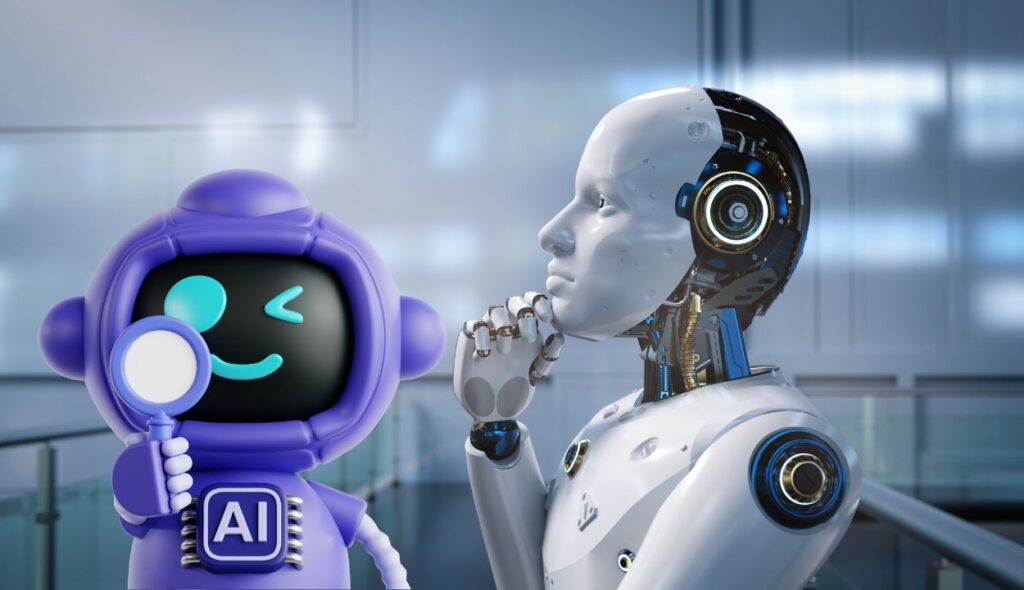Artificial Intelligence (AI) is no longer just a buzzword—it’s reshaping how businesses and individuals solve problems. Among the most powerful developments in AI are AI Agents. But what exactly are AI Agents, and how are they different from tools like ChatGPT or Gemini?
Let’s explore this in clear, simple English, with real-world examples and updated insights to help you understand this powerful technology.
What Is an AI Agent?
An AI Agent is an advanced system designed to perform tasks autonomously by combining decision-making abilities with access to tools, APIs, and data. Unlike regular AI tools (like ChatGPT), which answer your questions or give suggestions, AI agents are designed to take actions, complete tasks, and achieve specific goals on their own.

ChatGPT vs. AI Agents: Key Differences
1. ChatGPT Is a Brain, Not a Worker
ChatGPT and similar tools (Gemini, Claude, LLaMA, etc.) are known as Large Language Models (LLMs). They are trained on large datasets and excel at understanding and generating human-like text.
- They answer questions
- Offer suggestions
- Help with writing, planning, and more
However, they don’t act unless a user tells them what to do. They are like a brain without hands and feet.
2. AI Agents Think AND Act
AI agents use LLMs like ChatGPT as their brains, but they are also equipped with “limbs” in the form of API keys, databases, and automations. This lets them:
- Read and analyze data
- Interact with websites, platforms (like WhatsApp, Shopify, Google Sheets, etc.)
- Make decisions
- Complete tasks automatically
Real-Life Example: AI Agent for an E-Commerce Business
Let’s break this down using a simple example.
Scenario:
You run an online store and want to verify each customer’s order before processing it.
Traditional Way:
You or your staff manually check:
- If the customer placed a fake order
- Whether the address is complete
- If the customer is a repeat buyer
This process takes time and is prone to errors.
With an AI Agent:
You create an AI agent with the following setup:
- Goal: Verify and process customer orders accurately
- Brain: ChatGPT is used to understand incomplete addresses and identify potential issues
- Hands and Feet (APIs):
- WhatsApp API to ask for missing details from customers
- Shopify API to update the address or order status
- Courier APIs (like TCS, Leopards, BlueEx) to check order history
Now, the AI agent:
- Identifies incomplete addresses
- Contacts the customer via WhatsApp
- Updates the system automatically
- Flags suspicious orders for review
All this happens without human involvement, saving time and ensuring accuracy.
Multi-Agent Systems: Teams of AI Agents Working Together
In modern workflows, you can deploy multiple AI agents, each responsible for different tasks:
- Inventory Agent: Tracks stock and predicts shortages
- Marketing Agent: Manages ad campaigns
- Customer Support Agent: Answers queries or follows up on orders
- HR Agent: Handles hiring, onboarding, or task delegation
- Analytics Agent: Reviews past data and provides future projections
These agents communicate with each other. For example, the inventory agent might inform the marketing agent to pause ads for a product that’s out of stock.
This creates a seamless, automated ecosystem that boosts productivity and minimizes human error.
Do You Need to Be a Coder to Build AI Agents?
Not necessarily!
There are now no-code or low-code platforms that allow anyone to create AI agents with drag-and-drop simplicity. Some popular tools include:
- LangChain
- AgentGPT
- Autogen
- FlowiseAI
- SuperAGI
- Reworkd’s AutoGPT
However, if you do know Python or JavaScript, you’ll be able to create much more customized, flexible agents—especially for complex use cases.
Real-World Use Case: Inventory Management with Predictive Analysis
One business owner created a full workflow using AI agents that:
- Monitors inventory levels in real-time
- Sends WhatsApp notifications to suppliers
- Uses past data to predict future stock needs
- Helps avoid overstocking or running out of inventory
The agent accesses multiple databases and uses predictive AI to manage operations—just like a human manager, but faster and more accurately.
The Future of AI Agents in Pakistan and Beyond
AI innovation is happening across the world—and Pakistan is becoming part of that transformation. More developers, coders, and entrepreneurs are experimenting with AI agents in industries like:
- E-commerce
- Healthcare
- Logistics
- Education
- Public services
The goal is to create intelligent, scalable solutions for real-world problems at the national and business levels.
Final Thoughts
AI Agents are not just a trend—they are the next big step in automating work, enhancing productivity, and improving decision-making. Whether you are a business owner, developer, or enthusiast, now is the time to explore AI agents.
You don’t need to be an expert to get started. With modern tools and a clear understanding of your goals, you can build agents that save time, increase accuracy, and help you scale faster.



